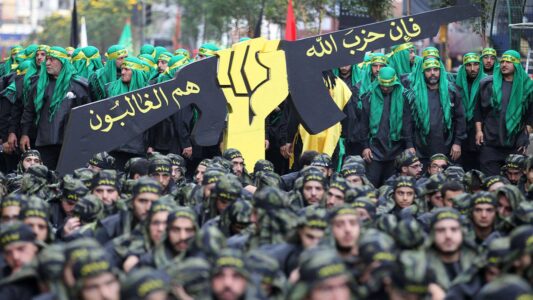
Europe must unite against Hezbollah terrorist group
Rarely do terrorist groups go unpunished after sponsoring deadly attacks in democratic jurisdictions, but that has unfortunately been the case in the European Union since 2012.
That year, during my tenure as Bulgaria’s deputy prime minister, a suicide bomber killed five Israelis and one Bulgarian in an attack that injured 35 more innocent people near Burgas on Bulgaria’s Black Sea coast.
A swift investigation, aided by Europol and the US, revealed that the attack was executed by terrorists with support from Hezbollah.
The source of the attack determined, Sofia called on the EU to designate Hezbollah as a foreign terror organization, a punishment that would ban every Hezbollah member from entering the EU and from accessing its financial system.
The thinking at the time was that the EU, surely, would severely punish the organization that facilitated cold-blooded murder within its borders.
But this didn’t occur. In 2013, the EU labeled only Hezbollah’s military wing a terror organization and left Hezbollah’s political leadership – which controls all facets of the organization, including the military – unpunished.
Hezbollah has taken advantage of this reprieve by laundering money through the European financial system and storing bomb-making materials across the continent. For Hezbollah, mainland Europe has proven to be a serene staging ground for future bloodshed.
Not only should Europeans feel insulted that the same group that terrorized its citizens lurks in their countries, they should fear the consequences of inaction. The threat of future bloodshed couldn’t be clearer, and for the safety of Europeans and the foreigners who reside in and visit the continent, the EU must fully ban Hezbollah.
The timing for such a designation appears to be ripe. Last year Germany banned Hezbollah after learning that it was stashing on its soil ammonium nitrate, the same explosive material used in the Burgas bombing. Lithuania and Slovenia also banned the group, and Estonia has blocked Hezbollah members from entering the country.
These new designations are welcome, and hopefully beget similar bans, but it is hard to fathom why it has taken so long. Calling Hezbollah what it is – a terror organization – is far from a novel concept.
The US designated Hezbollah a terror group in 1997 following years of Hezbollah’s Europe-based terror, including hijacking a Rome-bound plane and bombing Israel’s Embassy in London. Since that designation, in addition to the Burgas attack, Hezbollah has plotted further bloodshed in Europe, including a failed attack in Cyprus.
So, with this robust resumé of assorted terror, why haven’t EU member states come together to designate Hezbollah? Like many things in Europe, when an otherwise elementary equation is unsolvable, one must factor in Russia to find the true answer.
Russia is among Hezbollah’s unsavory allies and has worked alongside the terror group in Syria where they have successfully stabilized the murderous Assad regime during that country’s civil war.
Not crossing Russian President Vladimir Putin is perhaps the only explanation for why some governments resist fully designating Hezbollah as a terror organization. This reasoning could, unfortunately, explain why even the current Bulgarian government has remained silent on the 2012 Burgas attack.
Those who have worked against a full Hezbollah ban must ask themselves if whatever perceived short-term gain of embracing Putin is more important than preventing terror attacks in their countries. As Bulgaria’s 2012 investigation has shown, when Hezbollah succeeds in murdering civilians, it fails in hiding its involvement.
Should Hezbollah attempt additional attacks in Europe, their participation will be transparently revealed, and Putin won’t be able to restore the reputations of the countries through which Hezbollah’s footprints run.
Germany, Lithuania and Slovenia’s 2020 Hezbollah bans provide a timely springboard for doing what should have been done nine years ago. Choosing to keep in place the current diluted Hezbollah designation, instead of a full ban that would make committing terror in Europe more difficult, is a potentially deadly error of omission. It can be fixed with the stroke of a pen and a little political courage.
Source: JP





